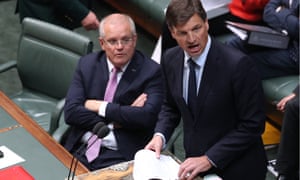Countries asked to flag plans for net zero emissions by 2050, but so far Australia is only talking about its 2030 target
The United Nations
secretary general, António Guterres, has written to all heads of state
asking countries to outline their plans to achieve net zero emissions by
2050, but at this stage the Australian government is only engaging on
commitments to 2030.
Ahead of a climate action summit in New York on 23 September, Guterres has reportedly asked leaders to flag plans they will set next year for 2030 emissions reduction commitments, and their plans to achieve net zero emissions by 2050.
A spokesman for the prime minister, Scott Morrison, says Australia will respond formally to the UN chief in due course, but when asked by Guardian Australia what commitments would be outlined, only addressed the 2030 target.
The spokesman said the Morrison government recognised “the serious challenge climate change presents, which is why Australia’s 2030 target is one of the strongest efforts among G20 countries”.
“The government has beaten Australia’s 2020 targets by 367 million
tonnes and has already clearly outlined Australia’s plan to meet our
2030 target which will cut the emissions intensity of our economy by two
thirds and reduce our emissions per person by half,” Morrison’s
spokesman said.Ahead of a climate action summit in New York on 23 September, Guterres has reportedly asked leaders to flag plans they will set next year for 2030 emissions reduction commitments, and their plans to achieve net zero emissions by 2050.
A spokesman for the prime minister, Scott Morrison, says Australia will respond formally to the UN chief in due course, but when asked by Guardian Australia what commitments would be outlined, only addressed the 2030 target.
The spokesman said the Morrison government recognised “the serious challenge climate change presents, which is why Australia’s 2030 target is one of the strongest efforts among G20 countries”.
Ahead of a climate meeting in Bonn in June, the Morrison government was challenged by the European Union and by China about whether it can meet its Paris commitments given the trend of rising emissions evident since the repeal of the carbon price, including increased pollution from vehicles.
The EU pointed out “on the basis of reported projections with existing policies and measures” Australia did not appear to be on track to meet the Paris commitment. It asked whether Australia would need further policies to meet the commitment, given the current trends.
In their responses, Australian government officials defended Australia’s policies, but in defending the status quo, officials also restated a commitment to “review and refine” domestic policies aligned with the five-yearly review process under the Paris agreement. “This approach will provide for integrated consideration of domestic policy and international targets, and provide guidance for industry about future policy review processes,” Australian officials said in June.
The EU and Canada ahead of the June talks in Bonn also queried the Coalition’s decision to use carry-over credits from the Kyoto Protocol in the carbon budget it outlined before the May election.
The Coalition is counting a 367 megatonne abatement from carry-over credits (an accounting system that allows countries to count carbon credits from exceeding their targets under the soon-to-be-obsolete Kyoto protocol periods against their Paris commitment for 2030) to help meet Australia’s 2030 target.
Australia’s carbon budget also factors in emissions reduction from the Snowy Hydro expansion; energy efficiency measures; an electric vehicle strategy that the government has not yet unveiled; pollution reduction from the rebadged emissions reduction fund and just under 100Mt of abatement from “technology solutions” which aren’t specified and “other sources of abatement” such as projects under development but not yet contracted.
The minister for emissions reduction, Angus Taylor, has found himself under pressure post election for presiding over a clear trend of emissions increases.
During the last parliamentary sitting week, Taylor was asked repeatedly whether emissions had risen in recent years, not fallen, with official data showing increases for the past three years.
The minister for emissions reduction argued pollution went “up and down” but he acknowledged emissions had risen, arguing the trend was attributable to booming liquefied natural gas exports, which he claimed helped lower global emissions.
In sharing that rationale, which experts have contested, Taylor did not mention Australia’s coal exports, which increase global pollution.

No comments:
Post a Comment